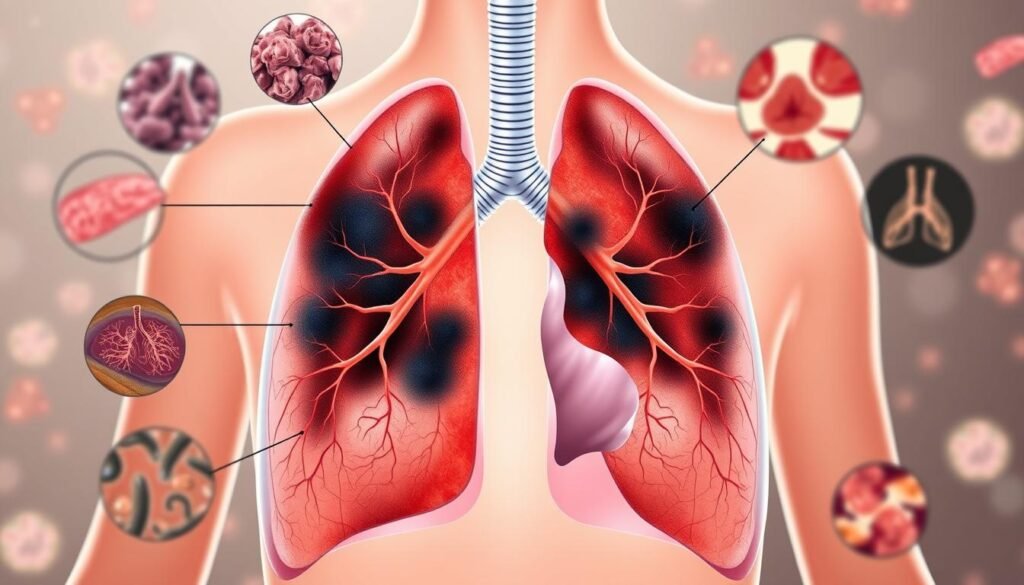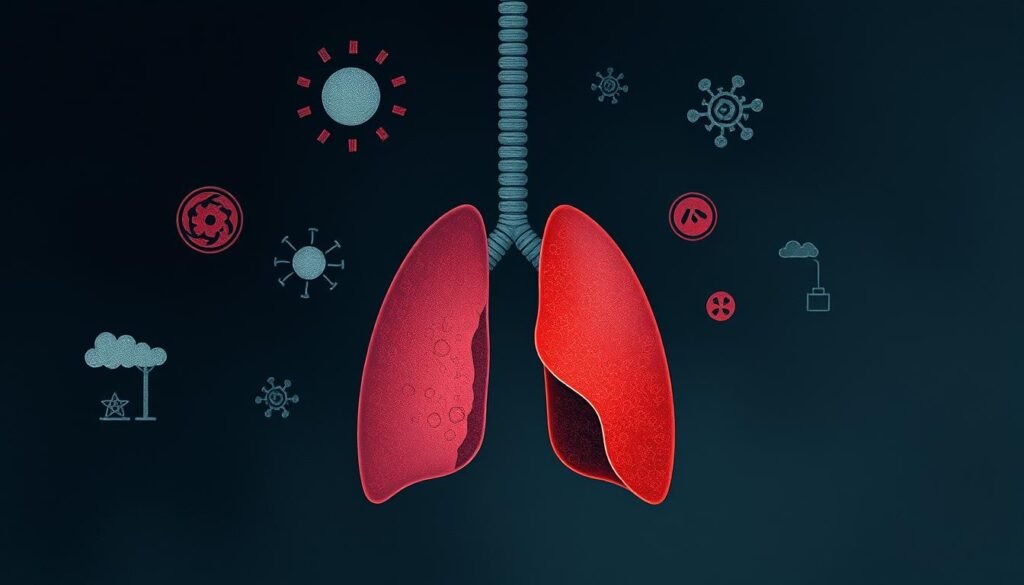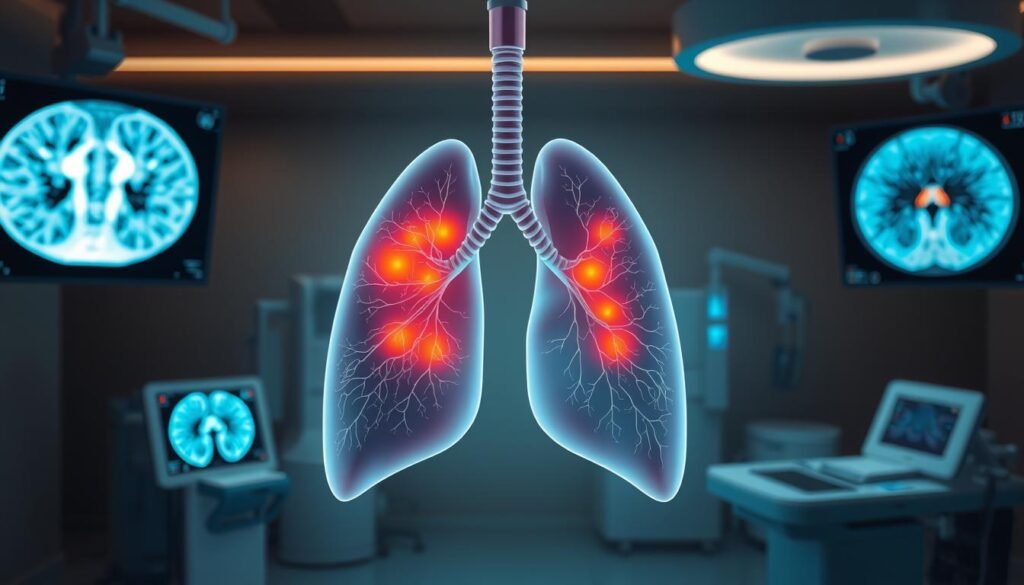About 20% to 40% of people with lung cancer may deal with chest pain. This fact shows how deeply lung cancer affects people’s lives and health. It’s the number one cancer killer worldwide, leading to serious issues like breathing problems and pleural effusion, seen in about 15% of cases.
It’s critical to understand the many complications and effects of lung cancer for patients and caregivers alike. Knowing about these problems can help improve care and management strategies. Here, we explore the symptoms, complications, and overall impact of lung cancer. This provides a full view on why awareness and education are key in dealing with this complex illness.
Key Takeaways
- 20% to 40% of lung cancer patients may experience chest pain.
- Pleural effusion affects around 15% of individuals with lung cancer.
- Early awareness of lung cancer complications is vital for effective management.
- Lung cancer can lead to a range of serious health effects beyond the initial diagnosis.
- Improving education on lung cancer complications can enhance patient care.
Introduction to Lung Cancer
Lung cancer is a major health problem. It starts in the lungs and leads to the most cancer deaths. Around 225,000 new cases are found each year in the U.S. More than 154,000 die because of it. This shows the need for more awareness and actions to prevent it.
Knowing what increases your risk of lung cancer is key. Smoking is the biggest cause, linked to 90% of cases. The risk goes up the more and longer someone smokes. Secondhand smoke, asbestos, radon, and air pollution also increase the risk. This highlights the link between our environment and lung cancer rates.
Lung cancer usually hits older adults, being rare in people under 45. It often shows up later in life. Knowing symptoms like ongoing coughs and chest pain is crucial for early detection. Early finding means a better chance of beating it. Screenings, especially for those 50 to 80 who have smoked, are important.
To wrap up, we need to understand lung cancer’s risk factors and impactful statistics. It’s important to encourage not smoking and better screening. These steps can change the direction of this fatal disease.
Common Lung Cancer Symptoms
Lung cancer often doesn’t show signs in the beginning. This makes early detection hard. However, some people might notice signs early on. They should then seek medical help. A new cough that lasts more than eight weeks is an important sign. As the cancer grows, more symptoms may appear.
- Chest pain, which may arise from tumor pressure or irritation in the lungs.
- Coughing up blood, commonly occurring in small amounts.
- Shortness of breath due to airway narrowing.
- Hoarseness associated with tumor interference with vocal cords.
- Fatigue and a general feeling of weakness.
- Unintended weight loss and loss of appetite.
- Frequent respiratory infections, including bronchitis and pneumonia.
As lung cancer grows, it can cause more severe issues. Early recognition of symptoms can greatly help the outcome. Seeing a doctor promptly can make a big difference. It leads to faster diagnosis and better treatment chances, improving outcomes.
Lung Cancer Complications
Lung cancer leads to many complications that affect life quality. It’s key for patients and caregivers to understand these challenges. These include breathing problems and other body-wide issues. Handling these properly can help make care better and more comfortable.
Shortness of Breath
Many with lung cancer feel short of breath. This often comes from blocked airways or fluid in the lungs. Clearing these blockages or managing fluid buildup is crucial. Around 40 percent of those with lung cancer face this issue.
Coughing Up Blood
Coughing up blood is serious and linked with lung cancer. It’s scary and might point to big health problems. Nearly 25 percent of such cases in the U.S. are due to lung tumors. Quick doctor visits are critical, especially for heavy bleeding.
Pain Management
Pain control is critical for those with lung cancer. Chest pain comes when tumors press on nerves or invade tissues. Good pain management is key. It lets people breathe, cough, or laugh more easily.
Pleural Effusion
Pleural effusion is a major lung cancer complication. It can seriously affect breathing. Treatments like draining excess fluid can relieve lung pressure. These steps aid in breathing and improve lung performance.

For more about lung cancer issues like pain and breathing problems, check out Medical News Today.
Impact of Lung Cancer on Health
Lung cancer deeply affects patients’ health, causing both physical and emotional strain. Symptoms include fatigue, pain, and difficulty moving. This leads to stress and lowers quality of life in lung cancer patients. Almost all patients report feeling exhausted and not wanting to eat, while many deal with ongoing pain. This makes everyday tasks hard.
Lung cancer also brings about serious health issues, like heart problems and breathing troubles. It’s important that both caregivers and healthcare workers understand these problems. This knowledge helps them offer better support to those in need. To learn more about early symptoms, you can find information here.
The journey lung cancer patients go through is shaped by constant pain, emotional struggles, and other health issues. Studies show these factors make their lives harder compared to others. Age and job situation affect how they view their daily life, too.

| Symptom | Percentage of Patients Reporting |
|---|---|
| Fatigue | 98% |
| Loss of Appetite | 98% |
| Respiratory Problems | 94% |
| Cough | 93% |
| Pain | 90% |
Dealing with lung cancer is tough, as the stats show. Understanding the full impact on quality of life in lung cancer patients is crucial. We need to focus on improving both their physical and emotional well-being.
Lung Cancer Diagnosis
Getting a correct and quick lung cancer diagnosis is key to effective treatment. It’s vital to know the different ways to diagnose it so we can act fast. Because lung cancer can grow without showing signs, finding it early is crucial for better survival chances.
Methods of Diagnosis
Doctors use a mix of tests to find out if someone has lung cancer. Some common ways to diagnose include:
- Imaging tests: CT scans and X-rays help spot unusual growths in the lungs.
- Biopsies: This is when a small piece of lung tissue is checked for cancer cells.
- Lung function tests: These tests measure how well the lungs work and look for problems.
People between 50 to 80 who smoked a lot should get yearly low-dose CT scans. These scans can find lung cancer early. Catching it early can make a big difference in treatment success.
Importance of Early Detection
Finding lung cancer early is a game-changer for patients. Lung cancer has stages 1 to 4. Stage 4 means the cancer has spread. People found to have lung cancer early have a better chance of surviving and more treatment options.
Telling people about how key early screening is can save lives. Knowing symptoms and risk factors encourages folks to get checked. For extra info on when to get screened for lung cancer, go to lung cancer screening information.

Lung Cancer Treatment Options
Looking into lung cancer treatment options is key for patients and their loved ones. A plan that’s based on the specific type and stage of cancer can make a big difference in results. The main treatments for lung cancer include surgery, chemotherapy, and radiation therapy. Each option has its own pros and cons. This helps patients make well-informed decisions about their treatment.
Surgery
Lung cancer surgery aims to remove the cancerous tumors or affected parts of the lung. It works best for early-stage non-small cell lung cancer (NSCLC). For very small cancers in stage I, doctors may do a segmentectomy or wedge resection. Lobectomy, which is more intense, offers the highest cure rate for serious cases.
Chemotherapy
Chemotherapy tries to kill cancer cells and is often used alongside surgery. For stage II NSCLC patients, neoadjuvant chemotherapy can make surgery more effective. If the cancer is in an advanced stage, doctors may combine chemotherapy with other treatments. This approach is better at fighting tough lung cancers.
Radiation Therapy
Radiation therapy targets cancer cells with high-energy beams. It’s crucial for treating stage IIIA NSCLC, usually alongside chemotherapy and sometimes immunotherapy. For patients with stage IIIB or IV cancer, radiation helps control symptoms when surgery isn’t possible. It ensures a better quality of life during treatment.
Lung Cancer Prognosis and Stages
Understanding lung cancer’s prognosis means knowing how lung cancer stages affect survival and treatment. Lung cancer is the top reason for cancer deaths in the U.S., more than the next three cancers combined. Early detection and treatment are key to better outcomes.
Understanding Lung Cancer Stages
Lung cancer is split into stages by how far it has spread. Nearly 40% of cases are found at stage IV. Early-stage lung cancer has a 60% chance of survival over five years. But, this drops to 6% for late-stage cancers. Knowing lung cancer stages is crucial for a correct prognosis.
Factors Affecting Prognosis
Many factors affecting prognosis are considered for lung cancer patients. These include tumor size, cell type, patient age, and health. Younger patients often do better. Those with early-stage non-small-cell lung cancer (NSCLC) have a 65% chance of living five more years. Changes in cancer cells and treatment responses also play big roles.
Talking openly with healthcare providers about prognosis and treatments is vital. These talks can help patients understand their situation and make choices. For more info on lung cancer prognosis, check this reliable resource.
| Lung Cancer Type | Localized 5-Year Survival Rate | Regional 5-Year Survival Rate | Distant 5-Year Survival Rate |
|---|---|---|---|
| Non-Small Cell Lung Cancer | 65% | 37% | 9% |
| Small Cell Lung Cancer | 30% | 18% | 3% |
Understanding lung cancer stages and prognosis is vital. It helps guide treatment choices and improves care for patients.
Living With Lung Cancer and Complications
Living with lung cancer means facing many challenges. These include effects on physical health and emotional well-being. It also impacts how you interact with others. Addressing these challenges is key to managing lung cancer. It’s crucial to support not just the patient, but their loved ones too.
Making certain lifestyle changes can be helpful. For example, eating plenty of fruits and vegetables may lower lung cancer risk. If you’re already diagnosed, a balanced diet keeps you strong. Studies show that high vitamin D levels can improve outcomes in early lung cancer stages. Quitting smoking is also critical. It can help you live longer, even if you have lung cancer.
It’s vital to monitor your health after lung cancer treatment. This means going for regular check-ups and getting tests like CT scans and blood tests. These help find any new issues early. Keeping detailed medical records is also important. It makes sure any new doctor understands your history. This can make managing lung cancer easier and less stressful.
Dealing with complications like pain or fatigue is important. Treatment might include medicine, inhalers, and nutritional support. Moderate exercise and staying hydrated help too. These steps can improve your life quality significantly.
| Common Symptoms | Management Strategies |
|---|---|
| Pain | Use prescribed medication and follow-up visits for pain management. |
| Shortness of Breath | Utilize inhalers or oxygen as directed and maintain calm breathing. |
| Fatigue | Engage in rest, keep a balanced diet, and moderate exercise. |
| Nausea | Stay hydrated and consume smaller, more frequent meals. |
| Skin Issues from Treatment | Moisturize skin regularly and consult healthcare providers for severe reactions. |
Conclusion
Understanding lung cancer complications is key to better outcomes. This article showed the big challenges patients face. These include difficulties during diagnosis and treatment.
Even with medical progress, many face serious complications. These issues affect survival rates and life quality. To improve this, healthcare workers must focus on complete care and early detection. This helps manage the disease better, reducing risks and boosting patient well-being.
Education on lung cancer care increases awareness for patients and their families. The healthcare community offers support and resources. This helps affected people make educated choices.
Research is critical in finding new ways to diagnose and treat lung cancer. It leads to innovations that could tackle both common and unique lung cancers. Non-small cell lung cancer is one area benefiting from this research.
The conversation on lung cancer continues to evolve. The focus on research and education is vital. By keeping up these discussions and supporting them, we can better fight lung cancer. For more information and detailed analysis, check out the full study available here.